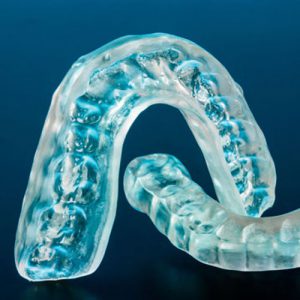Sleep apnea and other sleep breathing disorders affect millions of Americans each year.
But luckily, there are several treatment methods available that are used to treat sleep apnea effectively – other than the CPAP machine.

CPAP disadvantages
If you or a member of your family has sleep apnea, you probably are familiar with CPAP (Continuous Positive Airway Pressure), a cumbersome, noisy machine used to treat sleep apnea. A CPAP machine consists of a mask attached to a machine that must be worn while asleep. It is a common treatment method for sleep apnea, but it comes with several disadvantages.
Common problems CPAP patients experience include the following:
- Discomfort, skin irritation or rashes
- Dry mouth and/or throat
- Trouble sleeping due to noise generated by machine
- Inconvenient
- Issues with maintenance
If you have had problems with a CPAP machine or resisted treatment for your sleep apnea because you do not want to use a CPAP, there are other options.
Oral appliance therapy
At Pittsford Smiles Dental, our sleep apnea dentist, Dr. Ricardo, can prescribe oral appliance therapy to correct your sleep breathing disorder. These appliances prevent the breathing obstructions that occur during sleep by keeping the patient’s lower jaw in a forward position. This helps maintain an open airway throughout sleep, and thus, facilitate optimal airflow.
The chances are that you have seen many anti-snoring or sleep apnea mouthpieces available for purchase in stores or online. The oral appliances prescribed by Pittsford Smiles Dental are of a higher quality, however. Each oral appliance is custom made to fit the mouth of every individual patient for both maximum effectiveness and comfort so the appliance can be worn comfortably during sleep. Custom oral appliances can also be adjusted to experience the best results.
Sleep Apnea Fairport, Pittsford and Rochester, NY
If you have been diagnosed with sleep apnea, or you are showing symptoms of a sleep breathing disorder such as excessive daytime fatigue and lack of focus in combination with snoring, then contact our office in Pittsford, NY, today at (585) 248-2575 to schedule a consultation.
Pittsford Smiles Dental is here to serve patients in the area of Fairport, Pittsford, and Rochester, NY.
FAQs
One of the main symptoms of sleep apnea is snoring. Although it’s vital to understand that not all people who snore suffer from sleep apnea. Most commonly, a bed partner may notice periodical stops in your breathing for brief periods of time during the course of the night. Since people with sleep apnea have disrupted sleep, they usually suffer from excessive daytime sleepiness as well as headaches in the morning.
Sleep apnea is a rather dangerous disorder that can cause several health complications. When your breathing stops, the oxygen level in your blood can drop which in turn can result in strain on your cardiovascular system, forcing your heart to work harder. People who suffer from sleep apnea also have a higher risk of developing high blood pressure, having irregular heartbeats and diabetes. Untreated sleep apnea is associated with an increased risk of heart attacks and stroke.
In most cases, sleep apnea can usually be successfully treated. The most common treatment is a continuous positive airway pressure (CPAP). CPAP is delivered through a mask attached to a small CPAP machine that provides and maintains the air pressure. This pressure helps to keep the airway open and prevents the stopping of breathing during sleep. Although CPAP is very effective at treating sleep apnea, other options are also available including dental appliances and surgical options for sleep apnea. Weight loss may be effective if overweight, Myofunctional Therapy.
Myofunctional therapy refers to a practice in which repetitive exercises are used to strengthen and tone the facial muscles, such as those in the tongue, jaw, and cheeks. The exercises improve the function of the facial muscles and help to achieve a proper resting position of the tongue.
Myofunctional therapy helps to improve the function of the facial muscles, improving one’s ability to chew, talk and breathe properly. The therapy is also very useful in the treatment of sleep disordered breathing or sleep apnea, as it improves breathing problems and reinforces the correct position of the tongue, which can, in some cases, obstruct the airway. Myofunctional therapy can also be used for orthodontic purposes in cases where the tongue may be pushing against the teeth, causing unwanted movement and malocclusion.
Myofunctional therapy is often recommended for children suffering from orthodontic issues or a sleep breathing disorder, such as sleep apnea, as it is non-invasive and has none of the risks and side effects associated with surgical procedures or medications. Myofunctional therapy exercises can be practiced at home and is suitable for patients as young as six years old.
Don’t forget to share this via Twitter, Google+, Pinterest and LinkedIn.
